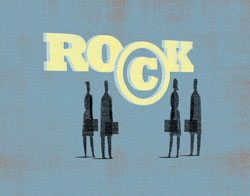Alternative rocker's crusade against lyric websites highlights copyright violations

Illustration by Jim Frazier
Admit it: You’ve turned to the Web to find lyrics to a song that you can’t get out of your head. And while your search probably yielded paydirt with plenty of song lyric websites, chances are you’ve probably never thought about whether the songwriter behind those lyrics is also getting a payoff from that search. But alternative rocker, mathematician and University of Georgia lecturer David Lowery has.
Lowery, who founded the bands Cracker and Camper Van Beethoven, has created the “Undesirable Lyric Website List” (with methodology that Lowery describes as “evolving”) to help spearhead an anti-piracy crusade that extends beyond streaming and downloads of music to the 50 most popular websites that share music lyrics without licenses.
After noticing that lyrics are frequent auto-fill suggestions in Web searches, Lowery determined that lyric websites were likely the source of some “serious Web traffic” probably monetized with advertising. Some companies even specialize in matching words in lyrics to key demographics for advertisers. Although there’s no central licensing database, Lowery says it is clear that many of the highest-traffic sites reprint lyrics without compensating songwriters. His own lyrics appear unlicensed on the popular Rap Genius site, which tops Lowery’s list of shame.
Lowery’s list (PDF) is intended to spur advertisers to consider liabilities before advertising on sites that feature unlicensed lyrics. The National Music Publishers’ Association has already sent takedown notices to several websites and is prepared to take “further legal action,” according to a press release. The association has already successfully litigated against LiveUniverse and LyricWiki, receiving judgments of more than $7 million on behalf of its members.
Though all deals are different, Lowery insists that it’s pretty inexpensive to license lyrics via direct deals or through licensing aggregators, particularly given the amount of traffic these sites generate. Two sites that do license, LyricFind and MusiXmatch, have proved successful, he notes. But for music artists, lyrics licensing can represent real money. For a time, Lowery published his own lyrics on a blog—which ran on donations—and it earned him a few thousand dollars a year.
“But I’m more interested in the general fight,” Lowery explains. “My lyrics are your Instagram photos. Shouldn’t we be asked before people use what we own?”
This article originally appeared in the April 2014 issue of the ABA Journal with this headline: “Get Off That: Alternative rocker’s crusade is the latest to highlight copyright violations.”



